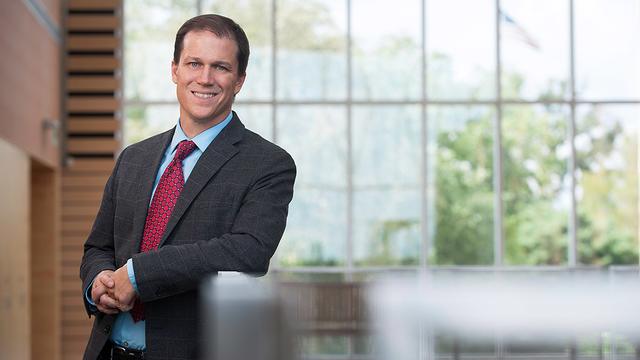Photo: Bruce Silcox
Community collaboration is at the heart of the Master of Development Practice (MDP) program at the Humphrey School of Public Affairs, so it’s only fitting that the director of the program, David Wilsey, is being recognized with this year’s University of Minnesota Outstanding Community Service Award.
Established in 1999, the award recognizes faculty, staff, students, and University-affiliated community members who have made significant, demonstrable contributions to the public good through research, teaching, and/or public service. Wilsey received the 2020 staff award at a March 5 ceremony.
Wilsey has worked with the MDP program since 2013. The MDP program, offered jointly by the Humphrey School and the Interdisciplinary Center for the Study of Global Change, trains practitioners who focus on sustainable development in the United States and globally.
Wilsey emphasizes the collaborative nature of the work. “We seek out partnerships and relationships in the community that enable us to support community ideas, objectives and goals, rather than dictating the priorities and pathways.”
Wilsey’s research interests revolve around sustainable agribusiness and market-based strategies for forest conservation, and his own activities over the course of his career have reflected that focus on community partnerships.
Sustainability, from Minnesota to the Rainforest
Wilsey primarily works with forest-based and forest-oriented groups ranging from northern Minnesota to the rainforests of Central America.
One longtime collaboration, with Dean Current of the University’s Center for Integrated Natural Resources and Agricultural Management (CINRAM), is based in the Maya Biosphere Reserve in northern Guatemala. The goal of their project is to help communities in that region develop markets for forest products, while safeguarding the forest from outside interests seeking to exploit its resources.
First, they helped set up a venture to sell sustainably harvested palm fronds to churches around the United States for use in Palm Sunday services. That organization, called Eco-Palms, is still going strong 15 years later. Their most recent project seeks to develop export markets for the ramón nut, the fruit of hardy trees that grow in the biosphere.
Wilsey says he is equally proud of his collaborations with organizations in Minnesota, especially the five years he spent as an Extension educator working with the state’s tribal communities on natural resource conservation and enterprise development. He worked with the Fond du Lac Band of Lake Superior Chippewa to establish its Tribal Extension Program, called Thirteen Moons, in 2009.
In 2012, Wilsey led the Minnesota Harvester Handbook project, which included dozens of collaborators, to develop a curriculum for sustainable forestry.
“What is most impressive to me is Dave's humble commitment to working in partnership with communities to address the issues and opportunities of primary importance to the people most impacted,” says Humphrey School Dean Laura Bloomberg. “As an academic, Dave does not drive the agenda in his community-engaged work. Rather, he sees his role as one of rallying the University's expertise and resources that communities need to thrive in a manner defined by and for themselves.”
Wilsey says it’s a privilege to be able to collaborate with community partners on such important issues.
“The joy that I get from doing this type of work is in having the opportunity to be involved in something that I wouldn’t have been part of, had not somebody allowed me in,” he says. “To be able to apply my skills to those challenges is really a once-in-a-lifetime opportunity that I’ve been able to have, more than once in a lifetime.”
Wilsey receives a cash award and recognition on an official plaque in the University’s Campus Club.


